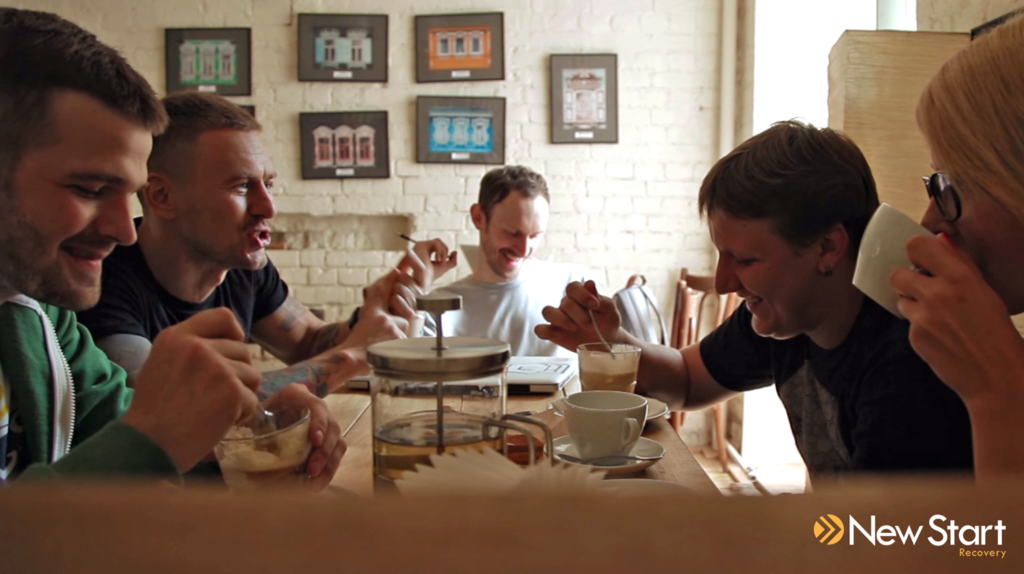As inconvenient as it may be, recovery is not a transitional phase. It doesn’t end once you’re “done” with treatment. The threat of relapse constantly lurks even when it seems our lives have returned to a positive trajectory. Rather, recovery is a lifestyle choice that requires active mindfulness about crisis prevention and activities of daily living. We should craft our home environments into safe recovery spaces before allowing behavioral autopilots to sabotage us. For better or worse, living situations affect long term sobriety in ways we often take for granted.
For Higher Power’s Sake, Don’t Live Alone
No matter how long you’ve been in sobriety, recovery is fraught with the peril of relapse. The likelihood of backsliding skyrockets when no one is there to talk you out of bad ideas or provide positive sober reinforcement. For Higher Power’s sake, don’t live alone if you can help it! Isolation often spells disaster for even the strongest among us. All too often, the decision to live alone eventually turns into a trip back to treatment.
Sober Living Offers Structure, Accountability
Most people in recovery have the best success in sober living. This structured environment encourages accountability not afforded by more casual living situations.
In a sober living house, recovering alcoholics and addicts board together to create a community of fellowship. Reputable ones offer house managers on site that supervise and enforce the rules. Most encourage the habit of maintaining ADLs through shared chores. Although there are manifold levels of strictness, we encourage people in recovery to seek out sober living houses that provide accountability. Otherwise, what’s the point?
For males in the north Orange County Area, we offer sober living and IOP arrangements. To ask about open beds, call our administration office: 855-737-7363
Significant Others: Remember, Your Sobriety is #1
Significant others have one of the biggest impacts on the fate of your sobriety. That why we have an entire category of relationship articles. S.O.S are often taken for granted, and due to our deep desires to be loved/needed/whatever, many people prioritize romantic relationships first. Things get even more complicated with marriage and children. But before discounting the possibility of change, consider this: recovery is ultimately a selfish act.
And not in a bad way. We are conditioned to believe that acting in our own interest at the expense of others is ultimately evil. But human behavior defies such reductionist explanation. Especially in the larger scope of our decades-long lives; making a selfish choice to end a toxic relationship now may benefit both of you years down the road. Similarly, acquiescing to time apart to focus on treatment may be hard on a positive relationship in the short term, but it will strengthen your bond in the long term. Either way, prioritizing your sobriety as #1 will ultimately keep you sober and provide clarity in your relationships. It’s a win-win.
And remember: most treatment programs and sober fellowships discourage forming new relationships within your first year of sobriety. It’s a vulnerable time where you should be focusing on yourself rather than someone else.
Staying Positively Engaged: Roomies & Pets
One of the biggest hurdles of maintaining a sober life is staying positively engaged with the world around you. People in recovery achieve this goal in different ways. Although sober living offers the most direct and guaranteed route, it is possible to find a good living situation with normies as well. We recommend looking at a few different parameters.
-
Find Sociable Roommates
Living with roommates who isolate isn’t much better than living alone. When seeking new living arrangements, we recommend gauging how sociable any potential new roommates are. Ask questions like, “Do you like hanging out with the people you live with? Ideally, how many hours a week would you like to see your roommates?”
-
Positive Routine Reinforcement
If you’ve found sociable roommates, great! Spend quality time with them to reinforce sober habits. Cooking and eating meals together, playing games, or just talking around the coffee table all help keep you sober long term. But most of all, these gatherings should be routine!
-
Responsible Pet Ownership
Animals require routine care and attention when kept as pets. If you’ve been in recovery for a decent amount of time, consider taking on the responsibility of owning a pet. Their feeding schedules, vet visits, and play times will all provide opportunities to be a responsible pet owner. Just make sure you’re serious about the commitment first!
Be Wary of Alcohol in the House
If you’re going to live with normie roommates, it’s likely that they will keep alcohol in the house. Maybe all the time, or maybe just for special occasions. It’s one of the reasons sober living is a safer bet for people in early recovery.
But if you still plan to seek normie roommates, it’s good practice to disclose your recovery to new roommates. That way, you can ask about their plans to store alcohol ahead of time. Respectful roomies will work with you on this issue. And by doing this, you’ll weed out roommates who are a bad influence.
How Living Situations Affect Long Term Sobriety
No matter how hard we work a program outside of the home, living situations affect long term sobriety. We can either take advantage of this fact or ignore it and risk our sober lifestyle. But why play with fire? Recovery is a lifestyle that needs to be constantly maintained.
If you or a loved one is seeking help for a substance abuse problem, call our addiction counselors any time for a free consultation over the phone: 855-737-7363


